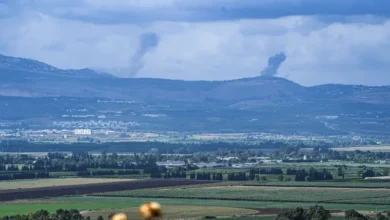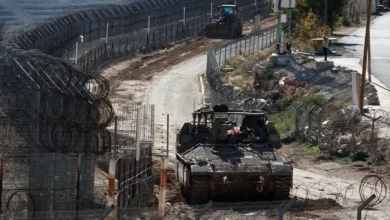GCC gears up as Australia, N.Zealand sheep export bans shake regional food security
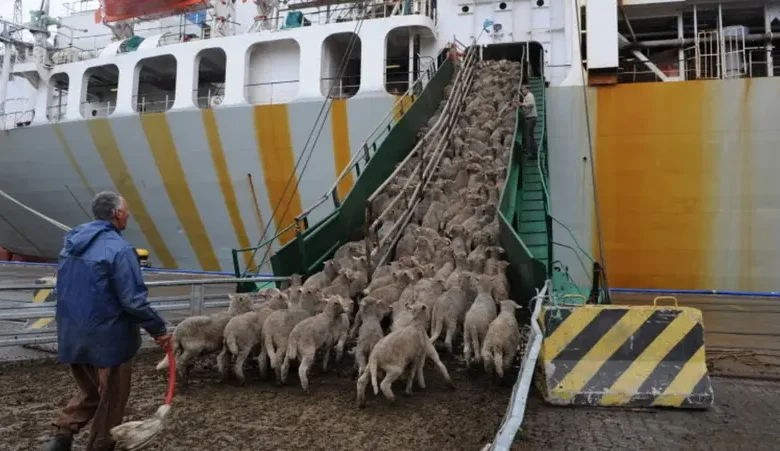
Saudi Arabia, the world’s largest importer of sheep, and its similar food import-dependent neighbor, the UAE, are taking charge of investments in innovative, homegrown food technologies in hopes of making the Gulf states and the wider MENA region self-sufficient and independent of imports from the likes of Australia and New Zealand.
New Zealand has completed its last livestock exports by sea. It ceased the operation as of mid-April as the country fully implemented a ban on export shipments of animals on the grounds of their welfare.
The government announced in 2021 that shipping animals offshore, mainly for building herds in trading partners like China, would be halted and farmers would be given two years to transition out of the profitable export business. It followed a review of live exports after the capsizing of a ship bound for China that killed nearly 6,000 cows and 41 of the 43 crew members.
Similarly, Australia has also begun phasing out live sheep exports. Only 575,000 sheep were exported live from Australia in 2021 globally, compared to two million in 2017.
They, too, have cited animal welfare concerns.
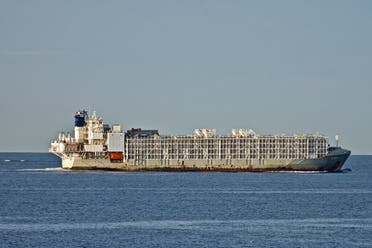
These sheep are typically loaded onto livestock ships departing from Western Australia to supply the Gulf markets. The voyage can last up to three weeks. Despite the ban on transporting animals during summer, it remains challenging.
In 2017, approximately 2,400 sheep died onboard a livestock ship traveling from Fremantle to the Middle East, primarily due to heat stress.
The bans will heavily affect parts of the GCC, which heavily rely on sheep exports.
According to a 2021 TrendEconomy report, the largest sheep importer was Saudi Arabia, with 29 percent of world imports ($494 million), followed by Oman, with 16.3 percent ($278 million), Jordan at 12 percent ($203 million), and Qatar with 6.93 percent ($117 million) of all global sheep imports.
Creating viable homegrown alternatives
Amine Ben, the COO of Verticroft Holdings, which owns and operates the UAE’s largest sustainable sheep farm, told Al Arabiya English that the changes in international practice require more homegrown solutions across the GCC to make up the shortfall.
“In this region, traditional farming practices face challenges due to limited resources and arid conditions, making food security a top priority. Over 80 percent of the region’s food supply is currently imported from overseas, and as a result, governments are making a significant effort to establish sustainable and locally produced alternatives,” Ben said.
“The recent planned phase-out of live animal exports in Australia and New Zealand has further underscored the urgency of creating viable homegrown alternatives that can match or even surpass the quality of imported goods.”
The Verticroft flock of fast-growing Australian White sheep has increased in numbers to more than 1,500 since the animals were first flown in on a Singapore Airlines plane in 2020.
Due to its early success, Verticroft Holdings is moving its operations from Dubai to a massive farm in Abu Dhabi with the capacity to rear 7,000 sheep sustainably.
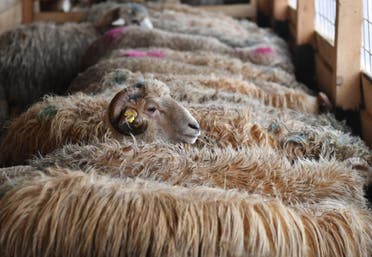
Sustainable sheep farming in Saudi Arabia
They are now eyeing expansion across the region, including Saudi Arabia, the world’s largest importer of sheep.
“Our future expansion plans include Saudi Arabia and other countries within the GCC region,” Ben told Al Arabiya English. “Saudi Arabia is indeed the world’s largest importer of sheep.”
“In accordance with the Australian Government Department of Agriculture, Fisheries, and Forestry, a phased approach towards ending live sheep exports from Australia by sea has been initiated.”
He continued, “It is important to note that this phase-out will not take place during the current term of the Australian Parliament, allowing individuals and businesses ample time to prepare for the transition away from live sheep exports by sea.”
Ben said, “It is worth noting that the phase-out will not affect other livestock export industries such as live cattle exports, nor will it impact live sheep exports by air.”
In a statement provided to Al Arabiya English, the Australian Department of Agriculture, Fisheries and Forestry said while Saudi Arabia no longer imports live sheep from Australia, the “Australian Government is firmly committed to strong global food supply chains and partnering with all countries to ensure food security across the Middle East.”
It added: “Noting Australia’s long-standing bilateral relationship with the Kingdom of Saudi Arabia, Australia will continue working with the Kingdom of Saudi Arabia to strengthen bilateral trade in agricultural commodities and food.
Nevertheless, the decision to phase out live sheep exports from Australia has brought the need for viable alternatives to imported sheep meat into sharper focus, according to Ben.
He said: “With an emphasis on sustainability and food security in Saudi Arabia and the wider region, it is now more critical than ever to develop local sources of high-quality sheep produced using sustainable and ethical farming practices.”
He added: “Sheep are of utmost importance to this region both for dietary and live animal requirements.”
According to Ben, “In the event that the ban on live sheep exports goes through and is finalized, this region will face challenges in terms of its live animal requirements, as air transport of live animals is prohibitively expensive, and large quantities of high-quality sheep are not readily available for export from surrounding nations.”
“Nonetheless, we have demonstrated that it is feasible to sustainably and ethically raise world-class, high-quality lamb in this region, provided the correct breed, farming practices, and feed solutions are employed.”
Ben said the goal is not to replace all imports overnight, adding, this would be a “monumental task.”
However, they believe that “through dedication, investment, and technology, it is possible to raise quality lamb in this region sustainably and ethically.”
Ben said that raising livestock in arid conditions can present difficulties, primarily due to the scarcity of water and feed resources.
“It is worth noting that this region does possess enough water to sustain sheep, and with the implementation of appropriate farming practices, breeding, and feed solutions, raising livestock in these conditions can be achieved.”
“Unfortunately, most farmers are currently employing inefficient breeds for meat production and relying on low-quality feeds without conducting any feed or nutritional analysis to formulate a balanced diet.”
“Nevertheless, with the aid of technology, innovative practices, and solutions that address these challenges, it is feasible to rear sheep in this region while maintaining sustainability and ethical farming practices.”
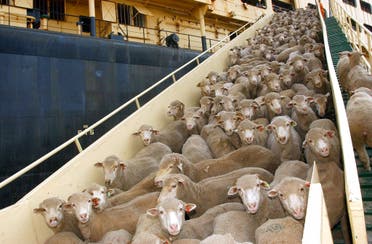
Switch from meat
And while some industry professionals look to replace imports with similar products made locally, others are turning to meat-less alternatives to fill that gap.
With quality lamb and mutton options seemingly dwindling in the wake of New Zealand’s live cattle export ban and Australia’s steady phasing out of similar exports, a long-time agro-tradesman in the UAE said it would not carry as significant of an impact as many expect.
Speaking to Al Arabiya English, Edward Hamod, who previously played a role in the supply of cattle feed and now runs a UAE-based alternative-meat company, said he is not worried about the ban, adding that the supply chain will adjust to changes.
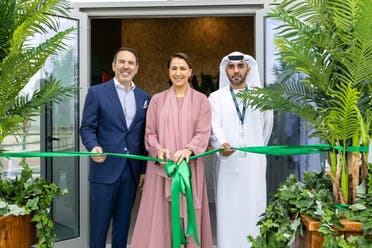
“You might lose a certain quality aspect, but no savings impact since Australian sheep was also at the high-end price point,” he said.
His newly launched startup, Switch Foods, focuses on sustainable, homegrown food production.
“You cannot bring a US product and assume that this product is going to work here in the UAE or Saudi Arabia,” Hamod said.
He is clear about the objective of his startup: his plant-based products are not a replacement for fresh meat, but rather, one step in the direction of localizing food sources, in turn contributing to national food security and source diversity, and providing a local alt-meat variety tailored to charm Middle Eastern palates.
Hamod is a ‘flexitarian’ – a semi-vegetarian diet form – using a mix of his company’s plant-based meat and the conventional kind.
“If we go out to a nice restaurant, and there’s steak, I have that,” Hamod disclosed, adding, “I would say I’ve reduced my meat consumption over the past couple of years by 50 percent.”
Providing an option for avid meat consumers that fulfils nutritional requirements and doesn’t break the wallet is Hamod’s aim with Switch Food’s products. Production in his Abu Dhabi operation commenced on May 1, with products expected to hit the shelves shortly.
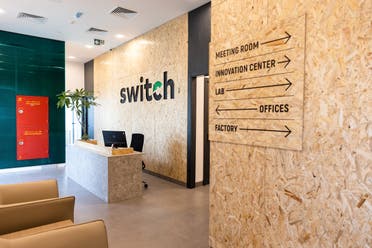
Apart from the commercial benefits of instituting within a growing food category, Hamod wanted to contribute toward an initiative to reduce food waste and align with the global pattern of governments inviting innovative food solutions that qualify sustainable and security requirements.
The pattern also aligns with the United Nation’s Sustainable Development Goals (SDGs), one aspect of which is to achieve “food security and improved nutrition and promote sustainable agriculture” – SDG 2.
At least 30 percent of the total food produced in a year is lost to inefficient value chain systems, according to a McKinsey report from 2022. At least 16 percent of the total amount is lost upstream – six at harvest, five after harvest, five during processing, and 14 percent downstream – five during distribution and nine during consumption.
“There’s no industry in the world today that can sustain this amount of waste,” Hamod remarked.
“This food system today doesn’t work,” he claimed, citing supply chain disruptions from the likes of a global pandemic or a war, in addition to a population explosion and increasing challenges from climate change.
To combat the supply chain concern, Switch Foods, on April 26, launched a plant-based meat production facility in an economic zone in the UAE capital city of Abu Dhabi that will serve residents of the Gulf state.
In March, another 100 percent plant-based meat factory opened in Dubai. It is run by the IFFCO Group, one of the UAE’s largest producers of food products.
Called ‘THRYVE,’ the factory will “catalyze the move towards a more sustainable and healthy food chain in the Middle East, actively supporting the United Nations’ Sustainable Development Goals and the UAE’s Vision 2051 initiative to bolster food security through diversity and innovation,” a report by the UAE’s state-run WAM news agency said at the time.
Middle Eastern countries import up to 90 percent of their food, according to a 2021 Alpen Capital GCC Food Industry report. The figure includes economic powerhouses Saudi Arabia and the UAE.
After the disruption of the global supply chain responsible for transporting foodstuff into import-dependent countries, GCC member nations adopted an early warning system to strictly monitor consumption and availability. They sent out notices to traders to diversify their food sources, while the leadership assured residents that they were well equipped to handle any fallouts from the dependency.
Following an assessment of the impact of COVID-19 on food, most GCC states set out to acquire or invest in companies that provide staples.
Switch Foods’ “tech-enabled nutrition” looks beyond staples that are “more of a filler,” Hamod said.
Various actors in the supply chain of an import-dependent country increased levies and tariffs, strikes in Brazil and Argentinian ports, and even the war in Russia disrupting shipping routes – are why Hamod implores local solutions.
“There is no investment in food security abroad that would replace actually investing in food security assets so that food producing assets are internalized and local,” Hamod reasoned.
“In times of crisis, each of these countries will act for their own good, for their own benefit.”
“We’re in discussions with some of our partners, Saudi partners, who are telling us, we might have the need for two facilities,” he said, signaling demand for Switch Foods’ products.
Family offices and personal investors from the UAE that did not want to be named are also investors in Hamod’s startup.
The global meat substitutes market is projected to grow from $5.88 billion in 2022 to $12.30 billion by 2029, according to a Fortune Business Insights analysis published in 2022.
